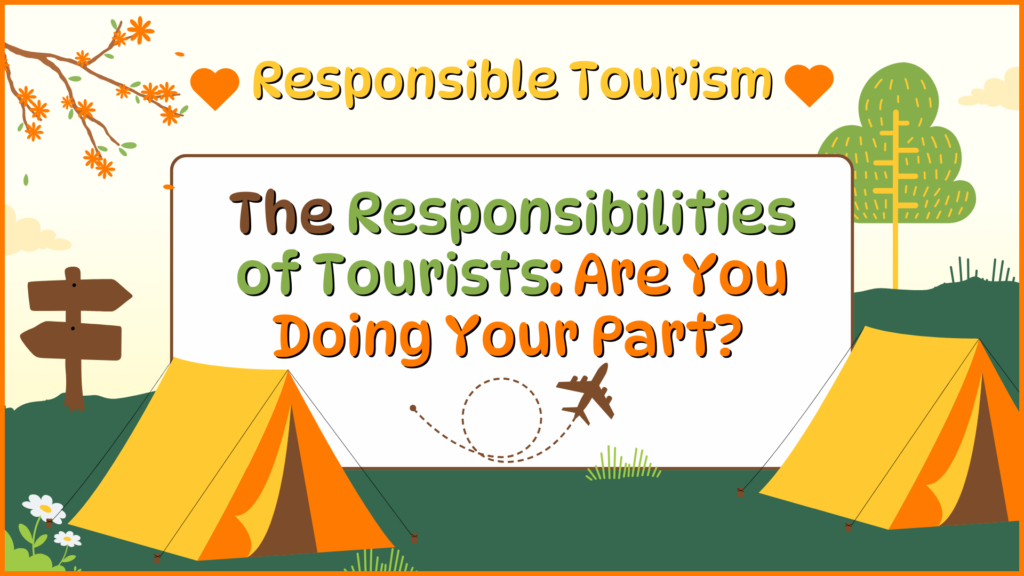Traveling is a cherished part of the human experience—a gateway to exploring new cultures, discovering breathtaking landscapes, and forging unforgettable memories. However, with this privilege comes a set of responsibilities that often go unnoticed amidst the excitement of planning and embarking on a journey. The concept of tourist responsibility is not just about following the local rules but encompasses a broader commitment to making travel a force for good. In this article, we will delve into the multifaceted responsibilities of tourists and examine how each of us can contribute to a more sustainable and respectful travel industry.
Understanding Tourist Responsibility

At its core, tourist responsibility involves recognizing the impact our actions have on the places we visit. It’s about being mindful of local customs, respecting the environment, and contributing positively to the communities we encounter. Responsible tourism means embracing an ethos that prioritizes the well-being of both the destination and its inhabitants. This approach not only enhances the travel experience but also ensures that future generations can enjoy the same wonders we do today.
Respecting Local Cultures and Traditions
One of the foremost responsibilities of tourists is to respect the cultures and traditions of their destinations. This means making an effort to understand and appreciate local customs, whether it’s through learning a few words in the native language, dressing modestly when required, or participating respectfully in cultural practices. For example, in Japan, removing your shoes is customary before entering someone’s home. Observing such practices demonstrates respect and fosters a positive cultural exchange.
Read: How to Support Local Communities While Traveling in 2024
Example: During a visit to Bhutan, a country known for its strong cultural preservation, tourists are expected to follow specific guidelines, such as wearing traditional attire when visiting temples. This adherence to local customs not only shows respect but also helps preserve the cultural heritage of the country.
Minimizing Environmental Impact
The environmental impact of tourism is a growing concern, with issues like pollution, waste, and resource depletion becoming increasingly prominent. Tourists have a responsibility to minimize their environmental footprint by adopting eco-friendly practices. Simple actions, such as reducing plastic use, conserving water and energy, and supporting sustainable businesses, can significantly contribute to preserving natural habitats.
Example: The rise of eco-tourism has led to initiatives like the “Leave No Trace” movement, which encourages travelers to clean up after themselves and leave natural areas as they found them. Many national parks and protected areas now offer guidelines to help tourists minimize their impact, such as using designated trails and proper waste disposal methods.
Supporting Local Economies
Tourism can be a powerful driver of economic development, but it’s crucial that the benefits are equitably distributed. Tourists can contribute to local economies by choosing to spend their money on locally-owned businesses, such as restaurants, shops, and accommodations. This not only supports the livelihoods of local residents but also ensures that tourism revenue stays within the community.
Example: In communities where mass tourism has led to the dominance of international chains, travelers who opt for locally-owned guesthouses or eateries can help create a more balanced economic environment. This approach also provides a more authentic travel experience and fosters a deeper connection with the destination.
Ethical Wildlife Encounters
Wildlife tourism, including safaris and animal encounters, is a popular but controversial aspect of travel. Tourists must exercise caution and ensure that their interactions with wildlife are ethical and non-exploitative. Supporting organizations that prioritize animal welfare and conservation efforts is crucial in ensuring that wildlife tourism does not contribute to harm or exploitation.
Example: In places like Kenya, where safari tourism is prevalent, responsible operators adhere to strict guidelines that prevent harm to animals and respect their natural behaviors. Tourists can research and choose operators that follow ethical practices, such as maintaining a respectful distance from wildlife and avoiding activities that could stress or endanger the animals.
Advocating for Social Responsibility
Tourists also have a role in advocating for social responsibility within the tourism industry. This involves supporting initiatives that promote fair labor practices, fight against human trafficking, and uphold human rights. Being aware of and speaking out against unethical practices contributes to a more just and equitable travel industry.
Example: The “Ethical Traveler” initiative encourages travelers to avoid destinations with poor human rights records and instead support countries and businesses that demonstrate a commitment to social justice and ethical practices.
Engaging in Community-Based Tourism
Community-based tourism offers a unique opportunity for travelers to engage directly with local communities and contribute to their development. This type of tourism emphasizes mutual benefits, where visitors learn from and support local residents while gaining an authentic experience. Participating in community-based projects or tours can help bridge cultural gaps and foster meaningful connections.
Example: In Peru, community-based tourism initiatives allow visitors to stay with indigenous families, participate in traditional farming practices, and learn about local customs. This not only provides economic benefits to the community but also promotes cultural exchange and mutual understanding.
Responsible Travel Planning
Effective travel planning is a cornerstone of responsible tourism. This includes researching destinations, understanding local customs and regulations, and being aware of the potential impact of travel choices. Responsible planning helps avoid pitfalls such as overcrowding in popular destinations and contributes to a more sustainable travel experience.
Example: Choosing off-peak travel times and less-visited destinations can help alleviate the pressure on overburdened tourist sites and provide a more serene and enjoyable experience for visitors.
Advocating for Sustainable Tourism Practices
Tourists can also play a role in advocating for broader changes within the tourism industry. This involves supporting and promoting sustainable practices, such as reducing carbon emissions, supporting green certifications, and encouraging businesses to adopt environmentally friendly practices.
Example: Tourists can support airlines and hotels that have made commitments to sustainability, such as reducing their carbon footprint or using renewable energy sources. By making informed choices, travelers can drive demand for more sustainable options and encourage industry-wide change.
Conclusion
As travelers, we hold a collective responsibility to ensure that our adventures contribute positively to the world. By respecting local cultures, minimizing environmental impact, supporting local economies, and advocating for ethical and sustainable practices, we can transform tourism into a powerful force for good. The journey towards responsible tourism is ongoing, but each step we take towards better practices makes a difference. So, the next time you set off on a new adventure, consider how you can do your part in making the world a better place for both its inhabitants and fellow travelers.



